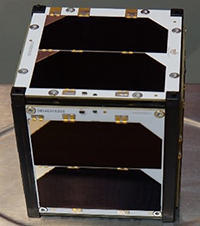KiboCUBE: Team from the Republic of Moldova Selected for Fourth Round
June 10, 2019 (JST)
National Research & Development Agency
Japan Aerospace Exploration Agency (JAXA)
United Nations Office for Outer Space Affairs (UNOOSA)
The Japan Aerospace Exploration Agency (JAXA) and the United Nations Office for Outer Space Affairs (UNOOSA) have been cooperating under the KiboCUBE programme launched in 2015 to provide opportunities to deploy CubeSats from the Japanese Experiment Module “Kibo” of the International Space Station (ISS).
JAXA and OOSA have selected a team from the National Center of Space Technologies of the Technical University of Moldova for the fourth round of KiboCUBE, which called for applications from October 1, 2018 to February 28, 2019. (Reference 1).
KiboCUBE contributes to the UN Sustainable Development Goals (SDGs), especially Goal 4 “Quality Education” and Goal 9 “Industry, Innovation, and Infrastructure,” and this programme aims to contribute to the enhancement of space related technology in developing countries. Last year, JAXA and OOSA have agreed to extend the KiboCUBE programme, and we are welcoming many applications for the current fifth round of KiboCUBE.(Reference 2).
(Reference 1) Selection of fourth round
|

|
|---|
(Reference 2) Fifth Round of KiboCUBE
| Application | : March 26th — September 30th, 2019 |
|---|---|
| For more information, please refer to UNOOSA website | : http://www.unoosa.org/oosa/en/ourwork/psa/hsti/kibocube/kibocube/3.2019.html |
Attached Sheet
【Comments】
Koichi Wakata, Director General, Human Spaceflight Technology, JAXA
I am very pleased that the National Center of Space Technologies of the University of Moldova has been selected to join the fourth round of the KiboCUBE programme and that JAXA, in cooperation with UNOOSA, will be part of the team effort to develop and deploy the first Moldovan satellite from the Kibo module on the ISS.It is exciting to see that KiboCUBE has developed into a sustainable program contributing to the advancement of space technology in multiple space emerging nations. With the help of UNOOSA’s extensive network across space emerging countries, we at JAXA are committed to fully utilize our technical competence and Kibo’s unique capabilities for the development of space technology in space emerging countries that do not have launching capabilities.
Simonetta Di Pippo, UNOOSA Director
The UNOOSA-JAXA KiboCUBE partnership is a great example of a triangular capacity-building initiative, where UNOOSA partners with a space-faring nation to assist non-space-faring nations develop their space technology. KiboCUBE is a pioneer project of UNOOSA under the “Access to Space For All” initiative, which offers a range of orbital and research opportunities. I am very proud that our partnership with JAXA on this programme has now reached its fourth round. My congratulations to the National Centre of Space Technologies of the Technical University of Moldova. I look forward to seeing the development and deployment of the first Moldovan satellite under the auspices of the UN.
Viorel Bostan, rector of Technical University of Moldova
On behalf of academic community of Technical University of Moldova I want to express my gratitude and thank you for JAXA and UNOOSA support of our TUMnanoSAT project elaborated at National Centre for Space Technologies at TUM. This project that will include the deployment in space of the first satellite from Republic of Moldova in the framefork of KiboCUBE programme under the auspices of UNOOSA and JAXA will have a major impact in enhancing the quality of engineering studies based on modern space technologies, in attracting young students to develop and strengthen the scientific research in the field of space exploration, in integration of the Republic of Moldova into the community of countries that develop space technologies and will increase the participation of our researchers in the development of future partnerships, including the common use of our ground infrastructure.